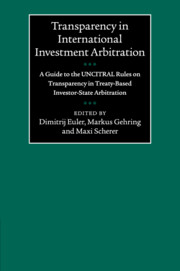 Transparency in International Investment Arbitration
Transparency in International Investment Arbitration Book contents
- Frontmatter
- Contents
- Contents
- List of contributors
- Foreword
- Acknowledgements
- Table of treaties, guidelines and rules
- Table of cases
- List of abbreviations
- 1 Introduction
- 2 Public interest in investment arbitration
- 3 Article 1. Scope of application
- 4 Article 2. Publication of information at the commencement of arbitral proceedings
- 5 Article 3. Publication of documents
- 6 Article 4. Submission by a third person
- 7 Article 5. Submission by a non-disputing Party to the treaty
- 8 Article 6. Hearings
- 9 Article 7. Exceptions to transparency
- 10 Article 8. Repository of published information
- 11 The application of transparency
- 12 Conclusion: The Rules as a swing of the pendulum?
- Index
3 - Article 1. Scope of application
Published online by Cambridge University Press: 05 August 2015
- Frontmatter
- Contents
- Contents
- List of contributors
- Foreword
- Acknowledgements
- Table of treaties, guidelines and rules
- Table of cases
- List of abbreviations
- 1 Introduction
- 2 Public interest in investment arbitration
- 3 Article 1. Scope of application
- 4 Article 2. Publication of information at the commencement of arbitral proceedings
- 5 Article 3. Publication of documents
- 6 Article 4. Submission by a third person
- 7 Article 5. Submission by a non-disputing Party to the treaty
- 8 Article 6. Hearings
- 9 Article 7. Exceptions to transparency
- 10 Article 8. Repository of published information
- 11 The application of transparency
- 12 Conclusion: The Rules as a swing of the pendulum?
- Index
Summary
3.1 Introduction
1. Transparency in international arbitration has been a topic of attention since the 1980s, but the intensity of discussions increased with the growth of investor-State dispute settlements beginning at the start of the twenty-first century. It was the North American region that began the move towards greater public access to information about and participation in arbitrations involving claims against governments. In 2001, the Free Trade Commission (FTC) of the North American Free Trade Agreement (NAFTA) issued a statement that ‘[n]othing in the NAFTA imposes a general duty of confidentiality on the disputing parties’ to an investor-State arbitration brought on the basis of the treaty. Moreover, the Commission revealed, the three NAFTA parties agreed ‘to make available to the public in a timely manner all documents submitted to, or issued by, Chapter Eleven tribunals’. Thus, while confidential or privileged information must be redacted, the dispute settlement documentation will be published. The FTC further opened NAFTA proceedings to the public over the next five years. In 2003, the acceptance of amicus submissions was clarified to be within tribunal discretion rather than subject to party will, and the following year Mexico supported the US and Canada's offer to allow for public hearings within the context of Chapter 11 arbitrations.
2. As the US and Canada continued to pursue the transparency agenda in their bilateral and regional investment relationships, other investment for a took up the issue. By 2006, the main international forum for investor-State dispute settlement had adopted revisions of its rules to permit greater public access. The International Centre for Settlement of Investment Disputes (ICSID) revised its Arbitration Rules (ICSID Rules) by adding several provisions to increase non-parties’ access to information and to the proceedings. Characterised as ‘modest, incremental and conservative’, the additions nevertheless do suggest a preference for more openness of the proceedings by making open hearings the default rule. They also give tribunals a clear mandate to determine whether non-party submissions will be accepted and mandate that at least ‘excerpts of the legal reasoning of the Tribunal’ be published once the Award has been issued.
- Type
- Chapter
- Information
- Transparency in International Investment ArbitrationA Guide to the UNCITRAL Rules on Transparency in Treaty-Based Investor-State Arbitration, pp. 28 - 63Publisher: Cambridge University PressPrint publication year: 2015


